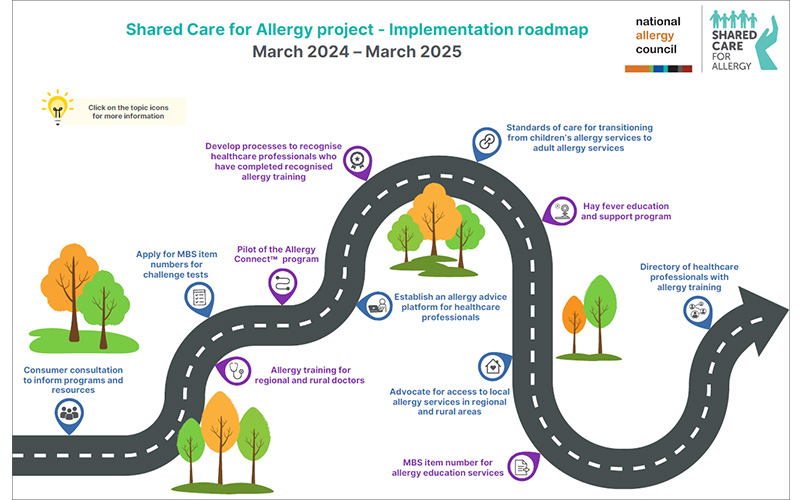Implementation roadmap
About Shared care | Principles | Bulletin | Consultation hub
The Shared Care for Allergy Project aims to improve access to care for people with an allergy, especially for people who live in rural and remote Australia.
The implementation roadmap on this page sets out key activities to improve access to care that will be progressed over the next year. The activities are being progressed by the National Allergy Council, the Australasian Society of Clinical Immunology and Allergy (ASCIA) and Allergy & Anaphylaxis Australia, who are working together on this project.
This implementation roadmap was developed based on consultations with people with allergies and those who care for them and meetings with our working groups.
View the roadmap to learn more about the activities being progressed between March 2024 and March 2025.
![]() Shared Care for Allergy project - Implementation roadmap 260 KB
Shared Care for Allergy project - Implementation roadmap 260 KB

Consumer consultation to inform programs and resources
Continue to engage with consumers through a variety of ways such as surveys and focus groups and engage with multicultural communities to understand health literacy issues and to help improve health literacy. Health literacy relates to how people access, understand and use health information in ways that benefit their health. Understanding more about multicultural communities will improve communication of health messages.
Allergy training for regional and rural doctors
Develop and deliver an allergy training course for regional and rural doctors to increase access to allergy services in regional and rural areas. The training will include supervised in-clinic learning to practice what has been learnt. Set up a Regional and Rural Clinical Allergy Network to make sure newly trained doctors stay connected and are able to access ongoing support and mentorship from experienced doctors, including clinical immunology/allergy specialists and each other. Evaluate the course content, effectiveness of learning, the way it is delivered, outcomes of learning, participant satisfaction and patient satisfaction.
Apply for MBS item numbers for challenge tests
Submit an application to the Government to apply for Medicare Benefits Schedule (MBS) item numbers for food challenges and drug challenges. Having MBS item numbers for food challenges and drug challenges will mean they can be performed by private clinical immunology/allergy specialists making them easier to access. There are long wait lists for food and drug challenges through public allergy services.
Pilot of the Allergy ConnectTM program
Pilot the Allergy ConnectTM program which provides online education and support to help people manage their allergic condition. Allergy ConnectTM is designed to help patients manage their allergic condition during the time between referral and their specialist appointment.
Establish an allergy advice platform for healthcare professionals
Establish a national online service for healthcare professionals to get direct advice from a clinical immunology/allergy specialist, similar to the Tele-derm service. This platform is being set up to help support health professionals with the diagnosis and management of allergic diseases.
Develop processes to recognise healthcare professionals who have completed recognised allergy training
Establish processes to validate healthcare professionals who have additional training and experience in allergy. This will make sure that healthcare professionals have the necessary training and experience to carry out their roles in allergy care. It will also make it easier for consumers to find a healthcare professional with appropriate allergy training.
Standards of care for transitioning from children’s allergy services to adult allergy services
Develop a national standard of care for the transition (change over) of children with allergies into adult allergy services. Improve the process and experience of transitioning from children’s services to adult allergy services. Ensure appropriate care and safety for young people with allergies moving into adulthood.
Hay fever education and support program
Develop and implement an allergic rhinitis (hay fever) education and support program focusing on people in regional and rural areas. Allergic rhinitis (hay fever) is a common allergic disease and the Allergic Rhinitis Starter Kit is a step-by-step education guide on treatments and everyday management for people living with allergic rhinitis to access.
Advocate for access to local allergy services in regional and rural areas
People with an allergy should get the best care no matter where they live. We will engage with decision-makers about how allergy services are delivered to people living in rural and remote areas to discuss models of care that have been shown to improve access to allergy services locally.
MBS item number for allergy education services
Submit an application to the Government to apply for a Medicare Benefits Schedule (MBS) for allergy education to be provided to individual patients by allergy nurses and allergy nurse practitioners. Allergy nurses and allergy nurse practitioners are ideally place to provide self-management education to people with allergies. This would help people with allergies, their families and carers to gain the knowledge, skills, and confidence they need to manage their allergic condition. This could help increase access to allergy education services in regional and rural areas.
Directory of healthcare professionals with allergy training
Work with existing online (website) healthcare professional directories that people can search to find healthcare professionals such as doctors, nurse practitioners, nurses and dietitians who have done additional training in allergy. The healthcare professionals listed in the directory will have gone through formal training and recognition pathways to demonstrate their allergy training and experience.
Stay informed
To stay informed about future consultation opportunities and find out how we are progressing:
Follow the National Allergy Council on social media (Facebook, LinkedIn, Instagram or Twitter)
Subscribe to the Shared Care for Allergy Bulletin
Helpful information
![]() Principles of shared care for allergy462.29 KB
Principles of shared care for allergy462.29 KB
![]() Shared care for allergy project overview523.73 KB
Shared care for allergy project overview523.73 KB
![]() Shared care for allergy glossary584.89 KB
Shared care for allergy glossary584.89 KB
If you have an enquiry about the project please email
Content created March 2024

